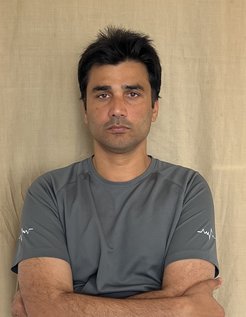Two new Skłodowska-Curie Postdoctoral Fellowships launch projects
Dr. Vikki N. Shinde and Dr. Muhammad Imran begin pioneering graphene research in synthesis and nanoribbon development in the Department of Synthetic Materials and Functional Devices, backed by Marie Skłodowska-Curie Fellowships.
Dr. Vikki N. Shinde - Project “Development of Fjord-Edged Graphene Nanoribbons by Rh-Catalyzed Stitching Polymerization” (April 2025 - March 2027)

Dr. Vikki’s research is focused on developing an efficient and attractive synthetic approach for constructing curved graphene nanoribbons (cGNRs), which are highly desirable in fields like optoelectronics and materials science. His primary objective is to synthesize novel curved GNRs in solution phase with precise control over their length and edge structures. Despite their unique edge topologies, narrow band gaps, and high carrier transport mobility, curved GNRs remain underdeveloped. To address this challenge, Dr. Vikki proposes a Rh-catalyzed stitching polymerization strategy that offers high conversion rates for cGNR synthesis. His method not only produces fjord-edged GNRs but also allows for the synthesis of helical GNRs, which are typically difficult to achieve. Additionally, this strategy is more responsive to the incorporation of heteroatoms. Dr. Vikki also plans to compare this approach with a living chain-growth polymerization strategy applied to the same substrate. Overall, the goal of this project is to establish a reliable synthetic route for cGNRs that are essential for various applications, while exploring their potential in electronic studies.
In 2016, Dr. Vikki began his PhD at BITS Pilani, Pilani campus, Rajasthan, India, where his research focused on the synthesis of novel heterocyclic small molecules through transition metal-catalyzed oxidative annulation reactions. In 2022, he embarked on his first postdoctoral research at Texas A&M University, United States, where he contributed to the design, synthesis, and characterization of fully fused conjugated ladder polymers. In 2025, Dr. Vikki further advanced his academic journey by joining the SFMD at the Max Planck Institute of Microstructure Physics as a Marie Skłodowska-Curie Actions (MSCA) Fellow.
Dr. Muhammad Imran - Project “Precision Synthesis of Magnetic Graphenoids as Room Temperature Two-Qubit Systems” (May 2025 - April 2027)

Dr. Imran's research focuses on Molecular Graphenoids (MGs), which possess intrinsic spin and are gaining attention as promising candidates for quantum applications owing to their exceptional quantum properties. His primary objective is to synthesize novel MGs with atomic precision utilizing scalable solution (wet) chemistry methods. By leveraging this approach, He aims to engineer MGs with precise control over their structural composition and spin characteristics. These MGs are anticipated to exhibit exceptional spin dynamics and quantum coherence, making them highly appealing for a variety of quantum technologies. His research endeavors hold immense potential for advancing the frontier of quantum technologies. Ultimately, by harnessing the distinctive spin properties of MGs, his work aims to pave the way for the development of carbon-based quantum materials for next-generation quantum devices.
Dr. Imran's academic journey has been marked by notable achievements. In 2017, he was awarded the esteemed Fulbright Fellowship to pursue his PhD studies at Lehigh University, PA, United States. His doctoral research primarily focused on the synthesis and device applications of open-shell molecular materials. Following his PhD, He embarked on his postdoctoral endeavors, joining SFMD at the Max Planck Institute of Microstructure Physics as an Alexander von Humboldt Postdoctoral Fellow in 2023.
About the Marie Skłodowska-Curie Postdoctoral Fellowship
The Marie Skłodowska-Curie Actions (MSCA) are a prestigious set of research fellowships established by the European Commission to strengthen research across the European Research Area (ERA). Launched in 1996 as the Marie Curie Actions, the MSCA are among the most competitive and esteemed programs in Europe. They are designed to support the career development and advanced training of researchers at the early stages of their careers. Emphasizing interdisciplinary research and international collaboration, the MSCA attract talented scientists from Europe and around the world, fostering global scientific exchange and innovation.













